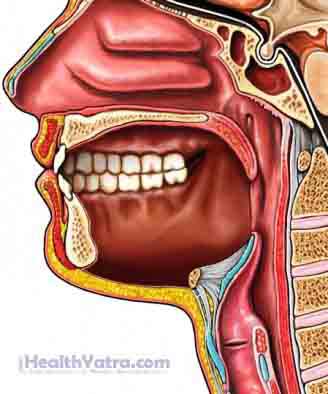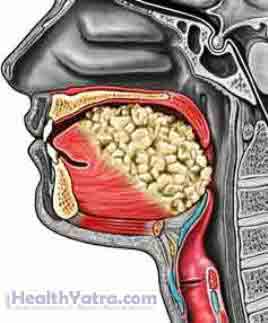Definition
A glossectomy is the surgical removal of all or part of the tongue. The surgery may be:
- Partial—removal of part of the tongue
- Hemi—one side of the tongue is removed
- Total—removal of the whole tongue

Reasons for Procedure
This surgery is used to treat tongue cancer. It is done when other treatments have not been successful.

Possible Complications
No procedure is completely free of risk. If you are planning to have glossectomy, your doctor will review a list of possible complications, which may include:
- Tongue bleeding
- Infection
- Airway blockage from swelling and bleeding
- Trouble swallowing and aspiration of liquids
- Being unable to speak
- Weight loss
- Failure of flap—occurs when transplanted skin or flap does not get enough blood flow
- Recurrence of cancer
Some factors that may increase the risk of complications include:
- Lung disease
- Large tumors
- Malnutrition
- Alcoholism
- Smoking
- Prior radiation
- Prior chemotherapy
- Diabetes
Be sure to discuss these risks with your doctor before the surgery.
What to Expect
Prior to Procedure
Your doctor may do the following:
- Blood work
- Physical exam
- Ask about your medical history, including whether you smoke or drink alcohol
- Biopsy of the tongue—a piece of tongue is removed and sent to a lab for testing to diagnose cancer
- X-ray or CT scan of the chest—tests that take a picture of structures inside the chest
- CT scan of the mouth and neck —a type of x-ray that uses a computer to make pictures of structures inside the body
Leading up to the surgery:
- Talk to your doctor about your medicines. You may be asked to stop taking some medicines up to one week before the procedure, like:
- Anti-inflammatory drugs (eg, aspirin )
- Blood thinners, such as clopidogrel (Plavix) or warfarin (Coumadin)
- Arrange for a ride to and from the hospital.
- Eat a light meal the night before. Do not eat or drink anything after midnight.
- If you have diabetes, ask your doctor if you need to adjust your medicines.
Anesthesia
General anesthesia will be used. It will block any pain and keep you asleep through the surgery.
Description of the Procedure
You will have a tracheotomy to allow you to breathe during and after surgery. This creates an opening from the outside of your neck to your windpipe. A tube is inserted through the opening so that you can breathe. It is usually temporary.
If part of the tongue needs to be removed, the doctor will remove this cancerous section. The remaining area of the tongue will be sewn so that there is no hole. Sometimes, a small graft of skin will be used to fill the hole. This skin graft will then be sewn into place.
If the entire tongue needs to be removed, this is a more complicated surgery. The doctor will remove the diseased tongue. A piece of skin from your wrist will also be removed. This skin graft will be placed in the hole left by the tongue. Blood vessels will also be attached from any remaining tongue to the graft. This is to ensure blood flow. Sometimes the lymph nodes in the neck will also need to be removed.
How Long Will It Take?
Several hours
How Much Will It Hurt?
Anesthesia will prevent pain during the surgery. You will have pain during recovery. Ask your doctor about medicine to help with the pain.
Average Hospital Stay
7-10 days
Post-procedure Care
At the Hospital
While recovering at the hospital, you may receive the following care:
- Oxygen through prongs attached to your nose for the first 1-2 days
- Nutrition through a tube—Once you are able to swallow, you will be able to have drinks and pureed food. If a total glossectomy is done, you may need a permanent feeding tube in your stomach.
- Fluids and medicines will be given through an IV
- Special boots or sock to help prevent blood clots—You will also be encouraged to get out of bed as soon as possible.
- Instructions to breathe deeply and cough 10-20 times every hour (for the first few days)—This will decrease the risk of pneumonia.
In addition, your doctor may have you:
- Work with a speech therapist to learn to speak and swallow after surgery
- Begin radiation therapy to treat the cancer if it had not been given before
At Home
When you return home, do the following to help ensure a smooth recovery:
- Gargle several times a day to prevent infection.
- Take antibiotics as prescribed.
- Take pain medicine to ease discomfort.
- Slowly resume your normal diet.
- Continue to work with a speech therapist.
- Be sure to follow your doctor’s instructions.
Call Your Doctor
After you leave the hospital, call your doctor if any of the following occurs:
- Signs of infection, including fever and chills
- Difficulty swallowing or choking on food or liquids
- Swelling, excessive bleeding, or discharge from mouth
- Pain and/or swelling in the feet, calves, or legs
- Problems with urination
- Cough, shortness of breath, chest pain, or severe nausea or vomiting
- Increased pain
- Any other worrisome symptom
In case of an emergency, call for medical help right away.
